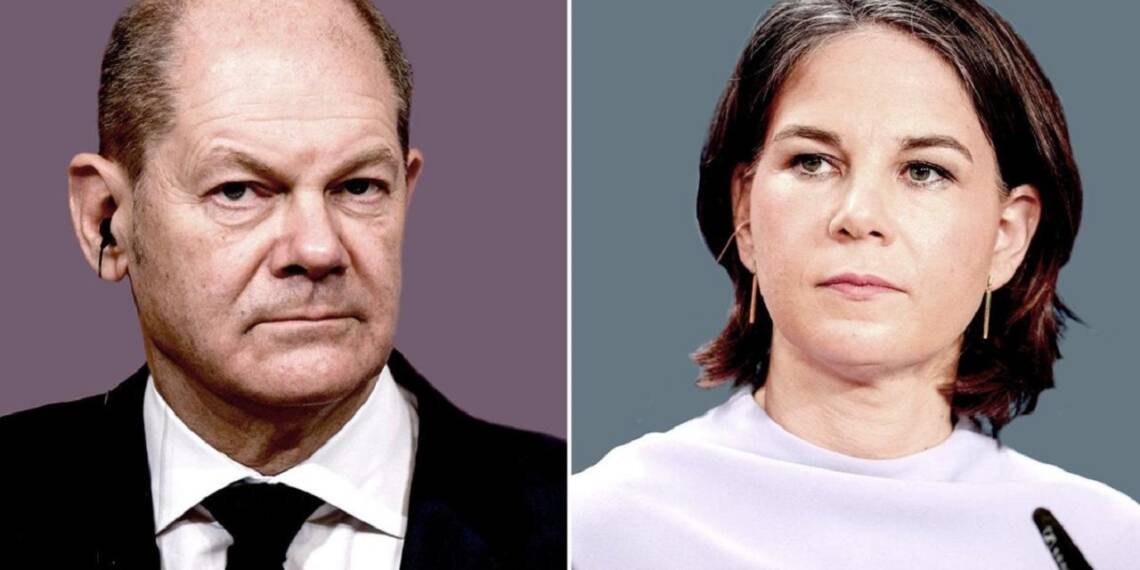A subtle but significant change to calm down the agitated people is going on in Germany.
German Chancellor Olaf Scholz is the next victim of the European Spring after Britain, Italy and North Macedonia post-Russia-Ukraine war.
Annalena Baerbock, the German Minister of Foreign Affairs and the second-most influential figure after Chancellor Scholz might take the reins and steer Germany out of this crisis.
In absence of any effective second line of leadership during Merkel’s rule, Olaf Scholz came to power only by virtue of his political seniority. Olaf Scholz’s approval rating has reached a record low as a result of widespread discontent. The examples are handy with his handling of the Ukraine war, Germany’s energy crisis, soaring inflation, and now a crippling summer drought. He has also drawn intense criticism for his role in a tax fraud scandal.
The largest economy in Europe is being pushed to the verge of recession by all of these causes. He has been criticised for lacking sufficient leadership.
According to a new poll released on Sunday, 62% of Germans are now dissatisfied with the job Mr. Scholz is doing as German Chancellor, up from 39% in March.

Only 25% of respondents to a survey by the German newspaper Bild am Sonntag said, they were satisfied with the chancellor’s work, which is the poorest score for Mr. Scholz since he took office in 2021.
With 65% of voters saying they were unhappy with the government’s performance, the “traffic light” coalition has also fared poorly. The reason has been its approach throughout the Ukraine war.
Ukraine war & De-industrialisation
Germany has been hoisted with its own petard. Berlin’s anti-Russia stance has backfired, pushing it under a crisis. It was one of the first countries to impose an embargo on Russia, including restrictions on import of gas. It also halted certification of the newly built Nord Stream 2 pipeline project, which was supposed to bring gas from Russia.
This move is frowned upon at home. Employers and labour organizations in Germany have banded together to oppose this ban on natural gas imports from Russia, citing concerns about rising prices and unemployment.
In just two months, the cost of electricity and gas increased more than double in Germany, with year-ahead power rates surging to 570 euros ($573) per megawatt hour. The price was 40 euros two years ago.
As manufacturers of German steel, chemicals, and auto components struggle to absorb power prices that soar to new highs practically every day, Europe’s industrial heartland faces a potential exodus.
Roland Harings, CEO of Hamburg-based Aurubis AG, the largest copper producer in Europe, wants to reduce gas consumption and pass on electricity costs to customers. In event of Russia entirely cutting off gas supply to Germany, sugar giant Suedzucker AG has developed emergency energy preparations, a representative said via email.
BMW AG is intensifying its planning in case of a shortfall. Due to increasing energy costs, packaging company Delkeskamp intends to shut down a paper mill in the northern city of Nortrup.
These are just a few examples of de-industrialisation that has begun in the European country. As a result, most economists now see a German recession as inevitable. All these signs are signalling toward a possible civil conflict that may erupt in the future.
Therefore, the easiest way for the coalition to stay in power would be to ask Olaf Scholz to step down.
Read More: Is Olaf Scholz resigning as the German Chancellor? Most probably yes
Baerbock – The next German Chancellor?
Amidst this entire crisis, Baerbock has emerged as a new favourite among Germans according to a poll taken by the Insa polling institute.
Annalena Baerbock and her party Greens’ are gaining momentum across Germany. Greens’ performance in the last general elections has pushed the party to grab the comfortable position of a kingmaker.
Albeit all this, Baerbock has already become a blue-eyed lady for common Germans. Berlin residents often joke that Baerbock is more approachable than German Chancellor Olaf Scholz. Baerbock is not Scholz, as she has mastered a balance act to support Ukraine but not go to the extent of going any fierce rhetoric against Russia.
Should elections be held today, Social Democratic Party (SPD) would garner 19% votes, much behind the junior coalition partners, the Greens, in view of Angela Merkel’s political retirement. Therefore, Baerbock would stand a good chance to be the chancellor of Germany.
What do you guys think, Can Baerbock replace Olaf Scholz as the German Chancellor?








